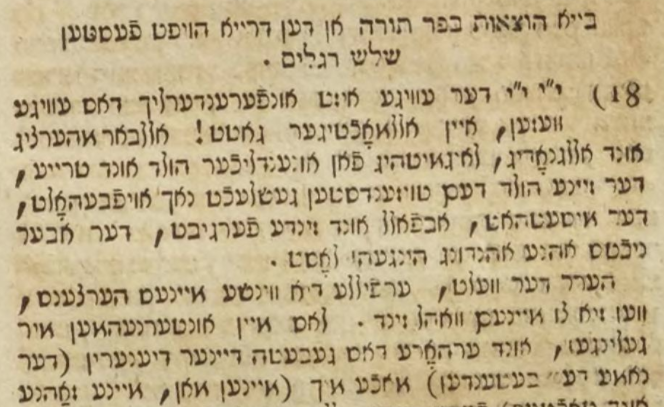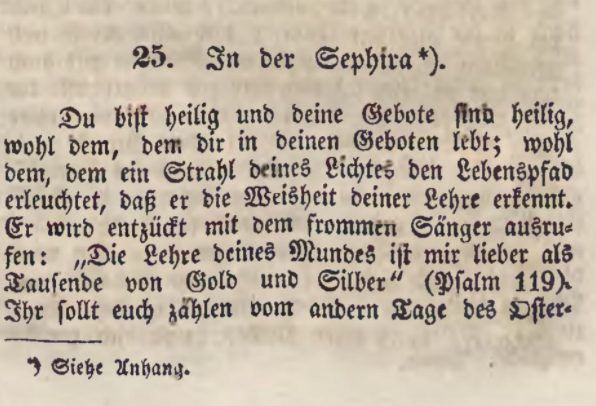| Source (German) | Translation (English) |
|---|---|
Am Osterfeste, Paßah. |
On the Spring Festival,[1] via Wikipedia: “The modern English term Easter, cognate with modern Dutch ooster and German Ostern, developed from an Old English word that usually appears in the form Ēastrun, -on, or -an; but also as Ēastru, -o; and Ēastre or Ēostre.[nb 4] Bede provides the only documentary source for the etymology of the word, in his eighth-century The Reckoning of Time. He wrote that Ēosturmōnaþ (Old English ‘Month of Ēostre’, translated in Bede’s time as ‘Paschal month’) was an English month, corresponding to April, which he says ‘was once called after a goddess of theirs named Ēostre, in whose honour feasts were celebrated in that month.'” Pesaḥ. |
Mit inniger Freude, allgerechter, allgütiger Vater, feiern wir heute die Erinnerung an die Wohlthaten, die du in jenen Jahren um diese Zeit unsern Vorfahren erzeigt hast. Es hat deiner Allweisheit gefallen, unsere Väter Jahrhunderte in egyptischer Sklaverei schmachten zu lassen, wie du es unserem Urvater Abraham verkündet hast (1 B. Mos. 15, 13). Du bist treu in deinen Verheißungen, und führtest ihre Erlösung unter großen Wundern herbei, zeigtest deine Allmacht in Egypten durch harte Strafen, und die Gerechtigkeit mit der du dich des Unterdrückten annimmst, der auf dich hofft und dir vertraut, und Rettung sendest wenn die Hoffnung schwindet, und der Leidende fast verzagen will. Zwar ist unsere Einsicht viel zu schwach, den Zusammenhang zu finden unter deinen Wunderthaten und die Endabsicht zu erkennen deiner wunderbaren Weltleitung; doch wird uns durch den Glauben klar, was unser Verstand nicht begreift. |
With heartfelt joy, all-just, all-good Father, we celebrate today the remembrance of the benefits you showed our ancestors in those years around this time. It pleased your all-wisdom to let our fathers languish in Egyptian slavery for centuries, as you proclaimed to our forefather Abraham (Genesis 15:13). You are faithful in your promises, and brought about their redemption under great miracles, showed your omnipotence in Egypt by severe punishments, and the justice with which you take care of the oppressed, who hopes in you and trusts you, and send rescue when hope fades, and the sufferer almost wants to give up. It is true that our insight is much too weak to find the connection between your miraculous deeds and to recognize the final intention of your wonderful world leadership; but what our intellect does not understand becomes clear to us through faith. |
Freiheit ist das köstlichste Gut jedes Menschen, unglücklich ist der, der dieses kostbare Gut verloren und sein Leben in Gefangenschaft hinschmachtet. Ach, und noch unglücklicher ist ein Volk, das unterdrückt ist, dessen geistige Kräfte und Anlagen sich nicht entwickeln können, das gebeugt unter der Willkühr seiner Unterdrücker zum Thier herabsinkt, und in seiner Entwürdigung nach nichts trachtet, nach nichts strebt, als was ihn die traurigen Tage seines Daseins erleichtern, was seinem Körper Erholung und Freude gewähren kann. Die Tugend ist im Herzen des Sklaven ausgeschlossen, der Edelmuth ist in ihm erstickt, und selbst die süßesten G[n]ade der Menschheit, die G[n]ade der ehelichen und elterlichen Liebe sind gelöst, und den süßen Namen Vaterland, und alle Tugenden, die sich an diesen Namen knüpfen, kennt der Sklave nicht. Aus deiner Gnade aber hast du Israel von allen Völkern zu einer großen Bestimmung erwählt, und dieses Volk deinen erstgebornen Sohn genannt (2 B. Mos. 4, 22), und aus Egypten hast du diesen deinen Sohn zur Freiheit gerufen (Hosua 11, 1). Die Freiheit ihres Leibes war freilich die Bedingung zur Erfüllung der großen Bestimmung des Volkes, dir ein priesterliches Volk zu sein (2 B. Mos. 19, 6), und die Erkenntniß deines heiligen Namens unter den Völkern der Erde zu verbreiten. Aber eine höhere heilige Freiheit hast du in ihrem Herzen aufgehen lassen, die Freiheit des Geistes; und ein heiliger Wille führte sie zum Berg Sinai, um sie frei zu machen von allen irdischen Banden und nur dir Unterthan zu sein, nur deinem Willen zu gehorchen. |
Freedom is the most precious good of every man; unhappy is he who has lost this precious good and languishes his life in captivity. Oh, and even more unhappy is a people who are oppressed, whose spiritual powers and dispositions cannot develop, who, bent under the arbitrariness of their oppressors, sink down to the level of an animal, and in their degradation strive for nothing, strive for nothing but what can ease the sad days of their existence, what can grant their body rest and joy. Virtue is excluded in the heart of the slave, nobility is suffocated in him, and even the sweetest graces of humanity, the graces of conjugal and parental love are dissolved, and the sweet name of fatherland, and all the virtues attached to that name, the slave does not know. But out of your grace you chose Israel from all peoples for a great destiny, and called this people your firstborn son (Exodus 4:22), and out of Egypt you called this son of yours to freedom (Hosea 11:1). The freedom of their body was, of course, the condition for the fulfillment of the great destiny of the people, to be a priestly nation to you (Exodus 19:6), and to spread the knowledge of your holy name among the peoples of the earth. But a higher, holy freedom you have set up in their hearts, the freedom of the spirit; and a holy will led them to Mount Sinai to make them free from all earthly bonds and to be subject only to you, to obey only your will. |
Sonne, Mond und Sterne bewegen sich nach ewigen, ihnen unbekannten Gesetzen, das Thier folgt blinden, unwiderstehlichen Trieben und hängt von dem Eindruck ab, den die äußern Dinge auf ihn machen; der Mensch allein ist jenen Gesetzen, diesen Trieben nicht ganz unterworfen, er kann wollen, er hat Freiheit; der Mensch kann überlegen, vergleichen und wählen. Er kann die Folgen seines Thuns erkennen, und wählt und thut das, was er für recht und gut, für das Beste in jedem Falle erkennt, er verwirft und fliehet das, was er für Unrecht und Böse hält. Aber ach, wenn der gute Geist im Menschen zu Gott strebt, so ziehet die Sinnlichkeit, die böse Begierde, ihn oft zur Erde hinab. Darum hat deine göttliche Gnade sich zu den Menschen herabgelassen, und ihnen deinen heiligen Willen bekannt gemacht. „Ich lege dir vor Leben und Tod, das Gute und das Böse, wähle das Leben” (5 B. Mos. 30, 15). Und um deiner Lehre Eingang im Herzen deines Volkes zu verschaffen, hast du ihm zuvor deine Allmacht und deine Allgüte aufs deutlichste bewiesen, ehe du das große Wort gesprochen: „Ich bin der Ewige, dein Gott!” Laß, o Gott, diese Betrachtungen an dem heutigen Feste, das wir das Fest der Freiheit nennen, uns im Guten stärken, damit wir die großen Wohlthaten, die du uns erzeigt hast, erkennen und würdigen. Laß uns erkennen unsere Würde als Menschen, als Freigeborene, bestimmt zur ewigen Seligkeit durch die Tugend und Gottesfurcht zu verherrlichen. Und wie du unsere Vorfahren erlöset und befreiet hast, so erlöse und befreie uns von der Sklaverei der Sünde. Amen. |
Sun, moon and stars move according to eternal laws unknown to them, animals follow blind, irresistible urges and depend on the impression that external things make on them; man alone is not completely subject to these laws, these urges, he can want, he has freedom; man can consider, compare and choose. He can recognize the consequences of his actions, and chooses and does what he knows to be right and good, the best in every case; he rejects and flees what he considers to be wrong and evil. But when the good spirit in man strives toward God, sensuality, the evil desire, often pulls him down to earth. That is why your divine grace has condescended to men and made your holy will known to them. “I set before thee life and death, good and evil; choose life” (Deuteronomy 30:15). And in order to make your doctrine enter the hearts of your people, you first proved to them your omnipotence and your omnibenevolence in the clearest way, before you spoke the great word: “I am the Eternal, Your God!” (Exodus 20:2) Let these reflections, O God, on today’s feast, which we call the feast of freedom, strengthen us in goodness, so that we may recognize and appreciate the great benefits you have shown us. Let us recognize our dignity as human beings, as freeborn, destined to glorify eternal bliss through virtue and godliness. And as you redeemed and liberated our ancestors, so redeem and liberate us from the slavery of sin. Amen. |
“Am Osterfeste, Paßah (פסח)” was translated/adapted by Yehoshua Heshil Miro and published in his anthology of teḥinot, בית יעקב (Beit Yaaqov) Allgemeines Gebetbuch für gebildete Frauen mosaischer Religion. It first appears in the 1829 edition, תחנות Teḥinot ein Gebetbuch für gebildete Frauenzimmer mosaischer Religion as teḥinah №23 on pp. 28-30. In the 1835 edition, it appears as teḥinah №23 on pp. 33-35. In the 1842 edition, it appears as teḥinah №25 on pp. 36-38.
We welcome corrections and improvements. The transcription of the German from Latin script in Fraktur type provided machine-readable text for a machine translation by DeepL, which we then edited for accuracy and clarity. –Aharon Varady
Source(s)


Notes
| 1 | via Wikipedia: “The modern English term Easter, cognate with modern Dutch ooster and German Ostern, developed from an Old English word that usually appears in the form Ēastrun, -on, or -an; but also as Ēastru, -o; and Ēastre or Ēostre.[nb 4] Bede provides the only documentary source for the etymology of the word, in his eighth-century The Reckoning of Time. He wrote that Ēosturmōnaþ (Old English ‘Month of Ēostre’, translated in Bede’s time as ‘Paschal month’) was an English month, corresponding to April, which he says ‘was once called after a goddess of theirs named Ēostre, in whose honour feasts were celebrated in that month.'” |
|---|

“Am Osterfeste, Paßah (פסח) [v.1] | Prayer on the Spring Festival, Pesaḥ (v.1) — a teḥinah by Yehoshua Heshil Miro (1829)” is shared through the Open Siddur Project with a Creative Commons Attribution-ShareAlike 4.0 International copyleft license.

![Desselben Inhalts [Am Osterfeste, Paßah] (Yehoshua Heshil Miro 1829)](https://opensiddur.org/wp-content/uploads/2022/02/Desselben-Inhalts-Am-Osterfeste-Pasah-Yehoshua-Heshil-Miro-1829.png)








Leave a Reply